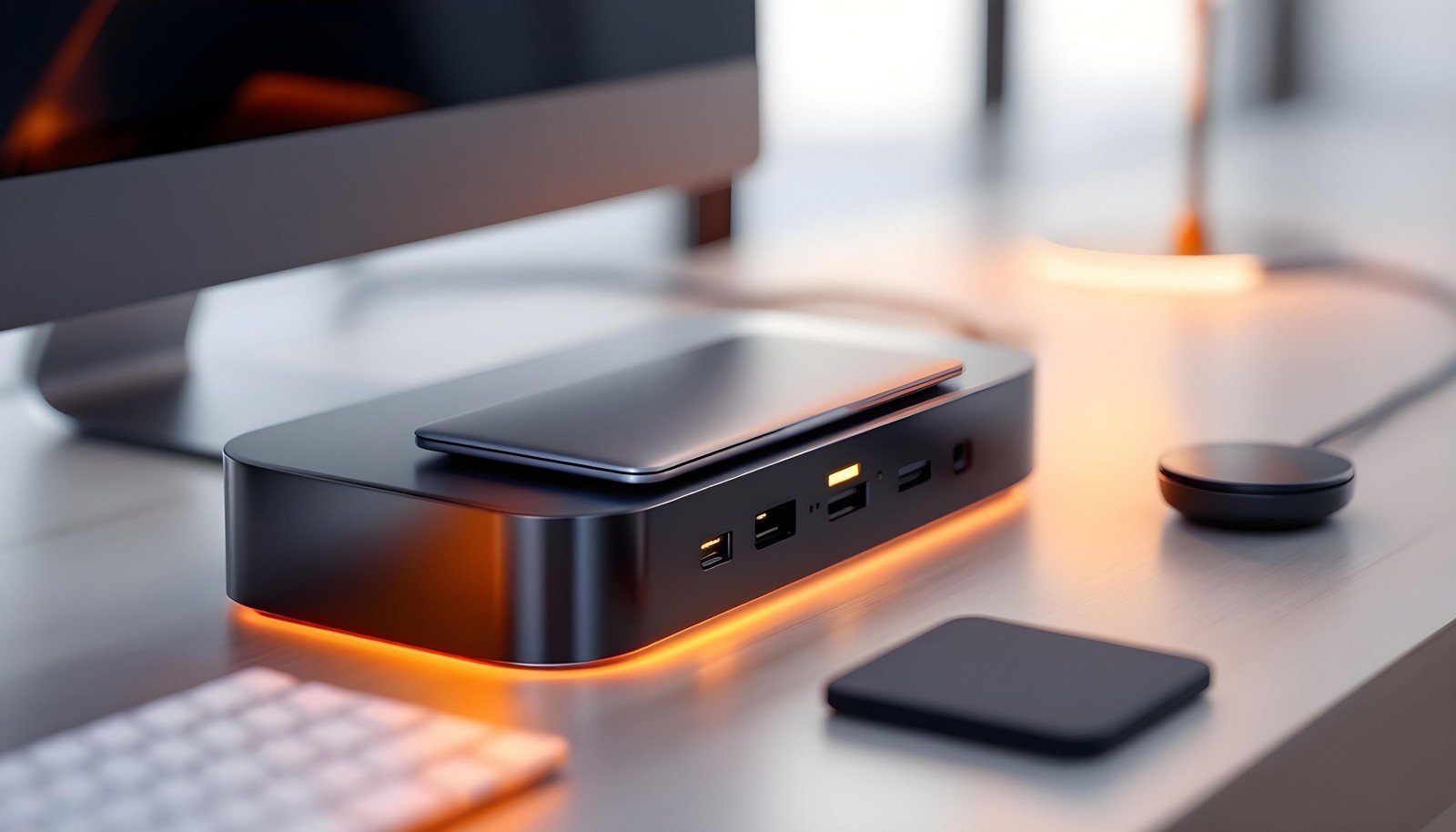Docking Station

Quick Navigation:
- Docking Station Definition
- Docking Station Explained Easy
- Docking Station Origin
- Docking Station Etymology
- Docking Station Usage Trends
- Docking Station Usage
- Docking Station Examples in Context
- Docking Station FAQ
- Docking Station Related Words
Docking Station Definition
A docking station is a hardware device that allows portable computers, such as laptops or tablets, to connect to a variety of peripherals and accessories, effectively transforming them into full-fledged desktop systems. It provides additional ports for USB devices, external monitors, Ethernet, and audio, often with power delivery capabilities. Docking stations are especially popular in professional environments for their ability to improve connectivity and productivity while reducing the need for multiple cables.
Docking Station Explained Easy
Imagine your laptop is like a Lego piece, and you want to attach it to a bigger Lego city full of cool gadgets, like bigger screens and faster internet. A docking station is like the special base that connects your Lego piece (the laptop) to the city. It helps everything work together without needing lots of separate wires.
Docking Station Origin
Docking stations were introduced in the late 1980s as a solution to the limited connectivity options on portable computers. Early docking stations primarily provided expansion slots and basic power connections. Over time, they evolved into more versatile hubs that support high-speed data transfer, video outputs, and even charging capabilities.
Docking Station Etymology
The term “docking station” comes from the word "dock," referring to the act of securely attaching or anchoring one object to another.
Docking Station Usage Trends
Docking stations have seen a resurgence in recent years due to the rise of remote work and the popularity of compact, lightweight laptops. As modern laptops reduce the number of built-in ports, docking stations provide a convenient way to expand connectivity. The demand for universal docks that support multiple operating systems and devices has also grown, driven by the rise of USB-C and Thunderbolt technologies.
Docking Station Usage
- Formal/Technical Tagging:
- Computer Accessories
- Connectivity Solutions
- Remote Work Equipment
- Typical Collocations:
- "USB-C docking station"
- "laptop docking station"
- "multi-port dock"
- "Thunderbolt dock"
Docking Station Examples in Context
- A docking station allows a laptop to connect to dual external monitors and an external hard drive while charging the device.
- Professionals working from home use docking stations to set up ergonomic workstations with keyboards, mice, and external displays.
- A universal docking station helps a shared office space support various devices from multiple brands.
Docking Station FAQ
- What is a docking station used for?
A docking station is used to connect laptops or tablets to multiple peripherals and accessories, enhancing connectivity and functionality. - Can a docking station charge my laptop?
Yes, many docking stations provide power delivery to charge laptops while connected. - Do docking stations work with all laptops?
Some docking stations are universal, but others are designed for specific brands or models. - What types of ports are available on docking stations?
Ports may include USB, HDMI, DisplayPort, Ethernet, audio jacks, and more. - Are docking stations portable?
While some are portable, most docking stations are designed for stationary use on a desk. - Do I need a specific cable to connect a docking station?
Yes, modern docking stations often use USB-C or Thunderbolt cables for connection. - What is the difference between a port replicator and a docking station?
A port replicator offers basic connectivity, while a docking station provides advanced features like power delivery and multiple video outputs. - Can I use a docking station with multiple monitors?
Yes, many docking stations support dual or even triple external monitor setups. - How does a docking station improve productivity?
By simplifying cable management and providing seamless access to peripherals, it creates a more efficient workspace. - Are docking stations compatible with gaming setups?
Yes, some high-performance docking stations are suitable for gaming, offering fast data transfer and display support.
Docking Station Related Words
- Categories/Topics:
- Computer Peripherals
- Office Equipment
- Connectivity Devices
Did you know? In 2020, docking stations became an essential tool for remote workers as global laptop sales soared, leading to a 25% rise in demand for docking solutions. Their ability to simplify multi-device setups made them a popular choice for home office configurations.
PicDictionary.com is an online dictionary in pictures. If you have questions or suggestions, please reach out to us on WhatsApp or Twitter.Authors | Arjun Vishnu | @ArjunAndVishnu

I am Vishnu. I like AI, Linux, Single Board Computers, and Cloud Computing. I create the web & video content, and I also write for popular websites.
My younger brother, Arjun handles image & video editing. Together, we run a YouTube Channel that's focused on reviewing gadgets and explaining technology.



Comments powered by CComment